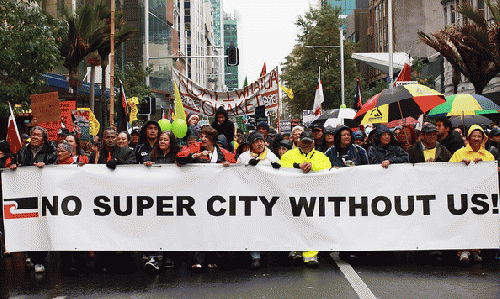(the following essay is the fourth from a new book about the unique perspective American expatriates develop on their native country)
For me personally, the advantages of living in New Zealand far outweigh the negatives. In my mind, this relates less to political, economic or social conditions than to personal experience that grassroots organizing is much easier here than in the US. For someone with a 30 plus year history of activism, this is obviously a high priority. Overall, I find Kiwis to be less alienated and apathetic than their American cousins, less likely to be taken in by the corporate hype they see on TV, and more confident about their ability to bring about change through collective action. I believe this relates, in large part, to a well-organized, militant indigenous (Maori) movement. Their highly visible activism models the importance of collective struggle for other New Zealanders, in much the same way the American civil rights struggle provided a role model for the US antiwar movement, women's, gay and disability rights movement.
There are also a number of institutional and social features of New Zealand society that make it somewhat easier to bring about change:
Institutional features:
- A parliamentary democracy coupled with elections conducted via proportional representation (which Kiwis won by hard, sustained grassroots organizing).
- The absence of any illusions about being a great military empire. As an American, you only fully realize the extent to which US militarism overshadows every aspect of your life once you leave (see http://stuartbramhall.aegauthorblogs.com/2011/02/10/american-ambivalence-towards-empire/).
- New Zealand is 100% anti-nuclear (both nuclear power and weapons), and US naval ships are banned in our ports because the US government refuses to indicate whether specific vessels are nuclear powered or carry nuclear arms. This, too, was won by sustained grassroots organizing.
- There is no death penalty in New Zealand.
- At presented, genetically engineered crops and farm animals aren't legally permitted in New Zealand (except in the laboratory). Unfortunately keeping New Zealand GE-free requires constant vigilance and sustained organizing.
- The cattle supplying New Zealand's world famous dairy and beef export industry are grass fed (except during drought years), and no Kiwi farmer would dream of injecting them with hormones or feeding them antibiotics to stimulate growth.
Social Features:
- New Zealand has a predominantly working class culture (see http://stuartbramhall.aegauthorblogs.com/2010/10/25/working-class-culture/), which given my own background, helped me fit in really quickly -- though middle class Americans seem to have more difficulty adjusting to living here. New Zealand still possesses the vestiges of an independent media that still engages in investigative journalism and regularly challenges and embarrasses the government in power. This seems to relate, in large part, to the mistrust of authority characteristic of working class culture. While much of the New Zealand media is foreign owned and blatantly pro-corporate, the country retains a lively and vocal independent media presence.
- Kiwis are much more likely to have a civic life than their American counterparts. Here in New Plymouth (population 55,000), most of my friends belong to the Green Party or the sustainability movement. However I also have friends who belong to Lions, Rotary or one of the many sports clubs (lawn bowling, cricket, soccer, rugby) or hobby groups (stamp club, little theater, orchid society, tramping club, canoe club and four cycling groups).
- New Zealand has a much stronger sustainability movement than the US, though its uptake by government and local authorities has been much slower than in the European Union. The late arrival of both TV and cheap imports in New Zealand means Kiwis, in essence, are only one generation away from growing vegetables and raising their own chickens and "making do" with jerry-rigged plumbing and home repairs and homemade cleaning and beauty products. Saving string and rags and hanging their wash on the line (high energy costs make it extremely expensive to use a clothes dryer) seem second nature here. Community currencies (local currencies introduced when high unemployment resulted in a shortage of Kiwi dollars) during the last international recession (1990-93) still survive in several local communities and have been incorporated into the sustainability movement.






